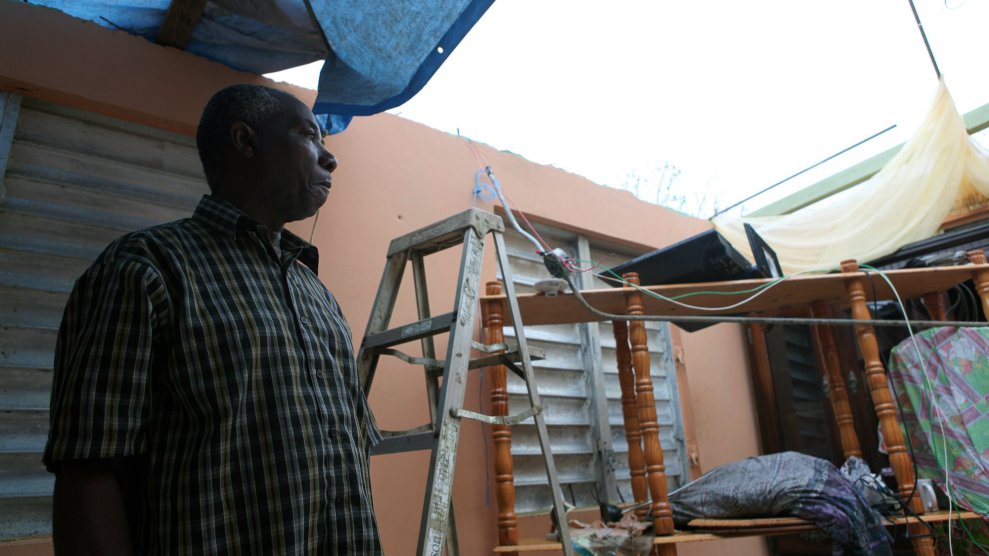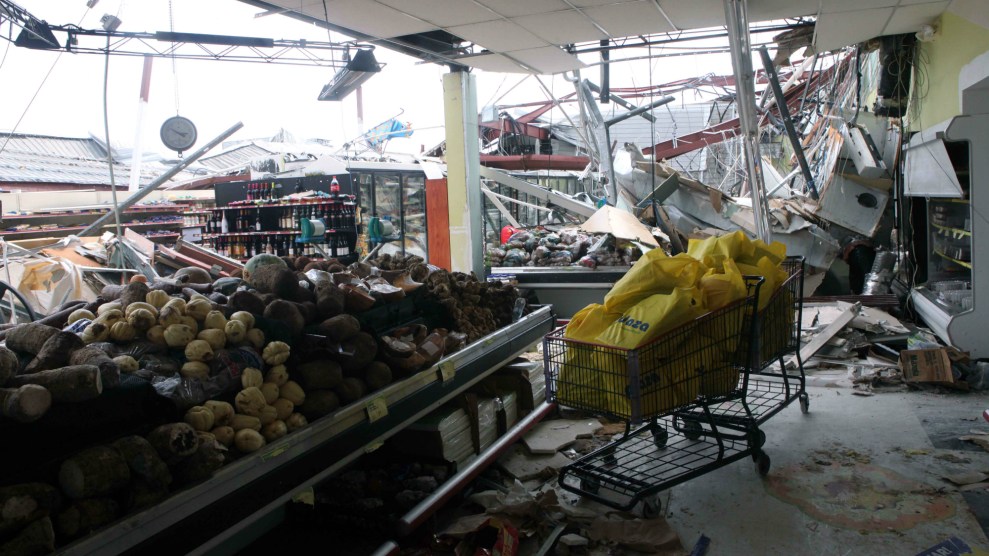Floodwaters persist in some streets in the Santurce neighborhood of San Juan on Wednesday, a week after Hurricane Maria descended on Puerto Rico. Victor J. Blue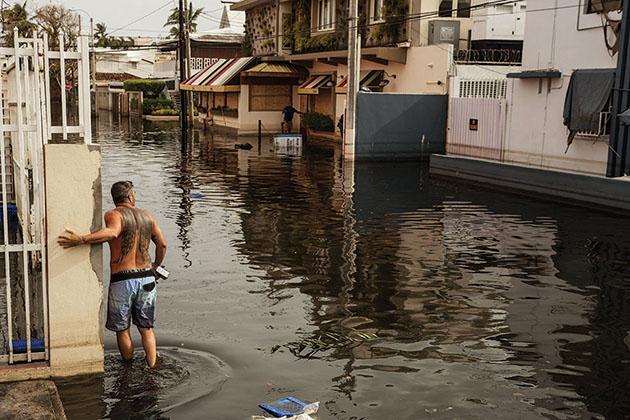
Ideologically, Nimia Vicens and her brother José Juan Vicens Huertas, my grandfather, were polar opposites. In a family of 12 children, they represented extremes in the spectrum of Puerto Rican identity: Nimia was a noted poet and an active member of the Puerto Rican Nationalist Party, known for its fervent calls for Puerto Rican independence from the island’s colonial rulers and, to the party’s enemies, occasional terrorist bombings. José Juan, a politically conservative World War II veteran who served in Europe and retired from the National Guard as a one-star general, had no interest in Puerto Rican autonomy. Instead he hoped his country would become the 51st state, with its residents enjoying the same rights as other US citizens.
My father, José Javier Vicens Morales—who died in 2016, and whom everyone knew as Jay Vicens—and his brother grew up with this contradictory tension between assimilating as mainland Americans and maintaining a distinct Puerto Rican identity. My father left the island in 10th grade and finished his education in California and Florida, where his white classmates sometimes teased him for being a “spic.” More than 2,700 miles separated my childhood home in Colorado from the island, and my father had his own, unspoken reasons for not bridging the divide between our two worlds. His ambivalence about his identity was passed down to his children. It wasn’t until a graduate school trip in 2012 that I visited his birthplace. Growing up, I had only a vague sense we had family there. I never even knew my father’s first name was José until a few years before he died.
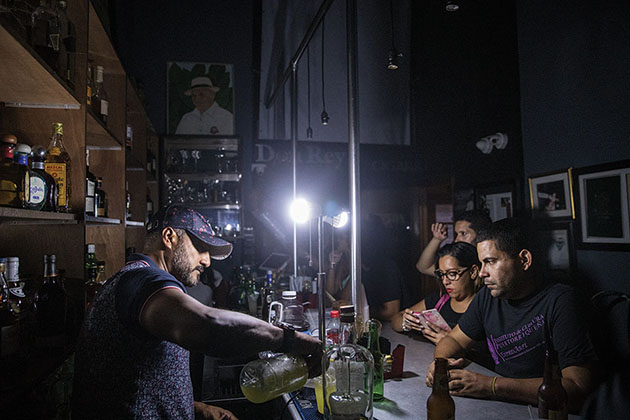
Hundreds of thousands of homes were without power a week after Hurricane Maria hit, and bars like Don Ray’s in San Juan provided electricity, community, and cold drinks.
Victor J. Blue
When Hurricane Maria ripped through the island on September 20, my dad’s brother—Uncle Van—told me that some of my relatives on the island had not been heard from since the storm; others whom I’d tried to reach through Facebook had not responded either. But a few of them did. One, my father’s cousin Ana Matanzo Vicens, a retired professor from the University of Puerto Rico School of Law, offered to host me in San Juan, where I traveled in early October. I would report on the hurricane for my day job as a journalist, but along the way I would also check in on my extended family.
Petite, with her long gray hair pulled back in a twist, Ana picked me up near the government’s command center at the convention center. I’d spent the previous week trekking across Puerto Rico, interviewing government officials and hurricane survivors, but in Ana’s company I felt the warmth of familiarity even though we’d never met in person. We arrived at her stylish apartment building, which, like most of the island, was still without power 18 days after the storm. As we climbed five floors, Ana explained that her neighbor, a thirtysomething psychologist, had lost her office and planned to move to the mainland. Since the hurricane, more than 100,000 residents have left. “Another young Puerto Rican professional is leaving,” Ana told me. “The country is just going to be old people and drug dealers.”
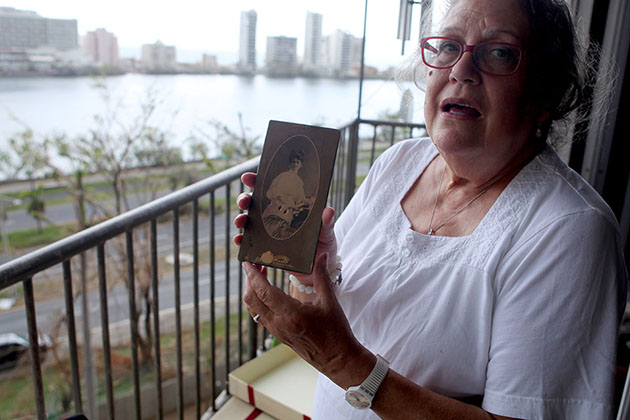
Ana Matanzo showing the author a picture of their relative.
AJ Vicens
Her balcony had a view many resorts would envy—overlooking the Condado Lagoon, a strip of tony hotels, and the Atlantic Ocean. A pair of green military helicopters flew by, low and loud enough to drown out our conversation, giving the impression of an occupied zone. Federal aid had supposedly arrived, but a lot of people I’d talked to around the island had handled most of the recovery themselves, as the local and federal governments struggled to coordinate their responses. The tally of fatalities stood at 34; by month’s end, it would reach more than 50, and bodies are still being discovered. Thousands of people were marooned in makeshift shelters, and many of the houses that weren’t demolished had no electricity or running water. I’d seen firsthand dozens of razed homes, and I’d met people who fell sick after wading through floodwater swirling with human waste and animal corpses. One funeral director in a town just a half-hour west of the government’s command center told me that he could barely keep up with all the bodies arriving; they were coming in “green,” he said, meaning already decomposing, a situation he’d never seen before.
Five days earlier, President Donald Trump had told Puerto Rican officials they should be “proud” that they hadn’t suffered a “real catastrophe” like Hurricane Katrina. It echoed his dismissive tweets and comments from some Hurricane Harvey survivors in Texas that Puerto Ricans did not deserve the same level of federal aid as they did.
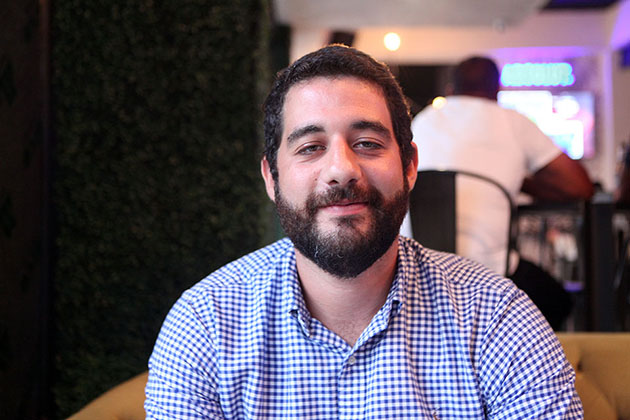
Pedro Matanzo.
AJ Vicens
My aunt had a small collection of family photographs, and she brought them out to the balcony to take advantage of the light. We laughed at a picture of my father dressed as a campesino. In another, he appears to be about seven or eight years old and wears a costume she says he hated: white, with a fluffy collar and a cone-shaped hat. My father had served in the Marines and lived through experiences that hardened him. The man I knew, a tough and traumatized Vietnam vet, was barely visible in the innocent little boy captured in the photo.
On a Monday afternoon, I met my second cousin Pedro Matanzo at a bar in the Santurce district of San Juan. Since the storm, Pedro said he’d been affected “in every single way you can think about,” but most of all, though he knew it didn’t compare to other travails, the lack of a working refrigerator at home was driving him crazy. The bar, with a humming generator powering air conditioning, a cooler of cold drinks, and televisions tuned to the New York Yankees playoff game, was an oasis. At 31, born and raised on the island, Pedro had a decent job working for a health care company, but he worried about his future in a place with unemployment at 10 percent, a median household income of about $20,000, and poverty hovering above 43 percent, double the rate in Mississippi, the lowest-ranked state in the United States. The island, which was already grappling with almost $130 billion in outstanding debt and unfunded pensions, now faces the challenge of coming up with tens of billions in rebuilding costs, which will further fuel emigration to the mainland. “We are watching a real live demographic and population collapse on a monumental scale,” Lyman Stone, an economist at the Agriculture Department, told the Washington Post in mid-October. The hurricane “might just be the kick in the pants Puerto Rico needs to really fall off this demographic cliff into total epochal-level demographic disaster.”
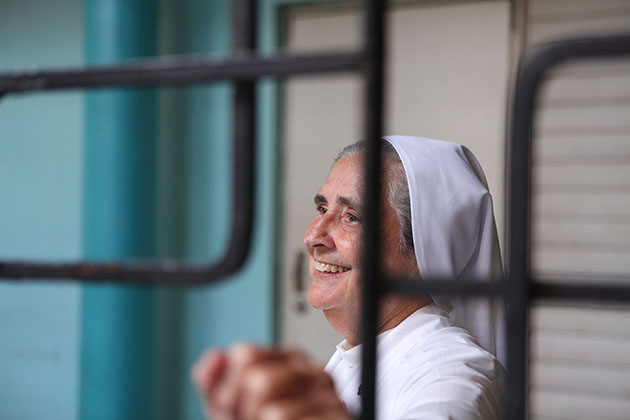
The author’s aunt, María Dolores, despises Trump for “humiliating people.”
AJ Vicens
The young people who remain are “looking at every angle of how to work it, how to stay alive,” Pedro told me. I asked him if he wanted to move to the mainland. “A lot of us are fighting to stay,” he said, sipping his beer, “but the system doesn’t want us to.”
Finally, I visited María Dolores, my dad’s half-aunt, also known as Sister María. She’s a 77-year-old nun and very active on Facebook. She is the principal at the Colegio de la Inmaculada, a Catholic school on a hill in Santurce. When I met her outside the school, one of the roof’s spires lay on the ground and the can0py of a sitting area had been torn off like the lid of a sardine can. We took a seat amid the wreckage and chatted, but after a short while María pulled out her phone and scrolled through images from around the island on her Facebook feed. She came across an article with a picture of Trump. She tightened her eyes and contorted her sweet face to mimic his angry sneer.
“He’s shameless,” she spit, “and disrespectful, and he humiliates people.”
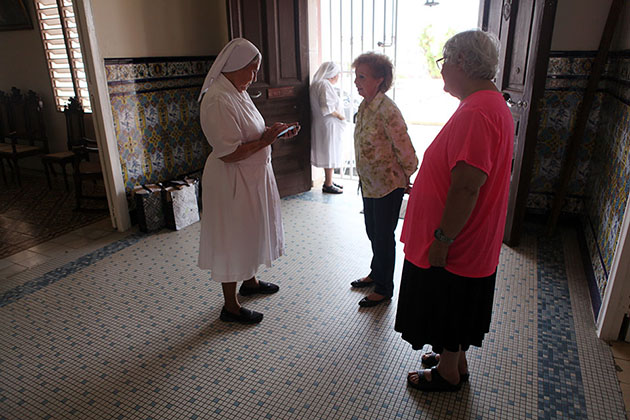
Maria Dolores talks with women donating items for the school.
AJ Vicens
I’d heard similar sentiments all across the island, from a young woman who had watched her neighborhood flood with wastewater, to a shopkeeper in the mountains who told me she was resigned to not having electricity for at least a year, to the angry woman I met at a bar who said she wouldn’t “waste her time” talking to the president if he came to visit her neighborhood. The words of Trump—that they hadn’t suffered a “real catastrophe”—echoed bitterly.
My father never explained his reasons for leaving the island, or for leaving his experiences of it absent from the lessons he bestowed upon his children. But perhaps part of the troubling discomfort about identity I had once thought unique to my father, Jay, whom I never knew as José, was a national trait. The touchy, often alienated attitude many of us harbored was a kind of microcosm of the relationship between Puerto Ricans and the mainland. This dual identity informed the US response to the hurricane and Puerto Ricans’ response to shoddy US relief efforts. It is a tension that has existed for generations. Hurricane Maria simply, once again, brought it painfully to the surface.
Before parting, María—my great-aunt—told me that she considers me her sobrino, her “nephew,” just as my dad was. She said my father used to tell her that she was his favorite aunt, and we both teared up as she described his last visit in 2014, when he sat in the same spot as I sat, before María said goodbye to him for the last time.

